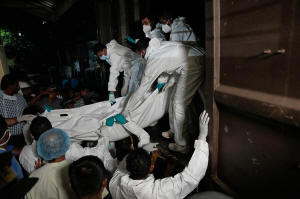Sri Lanka recovers 87 bodies from Iranian warship sunk off its coast by
a US submarine
[March 05, 2026]
By KRISHAN FRANCIS and BHARATHA MALLAWARACHI
GALLE, Sri Lanka (AP) — A torpedo fired by a U.S. submarine sank an
Iranian warship off the coast of Sri Lanka, whose navy said Wednesday it
recovered 87 bodies and rescued 32 people.
The Iranian vessel sunk in the Indian Ocean was the Islamic Republic’s
“prize ship,” U.S. Defense Secretary Pete Hegseth said. It was one of
the few instances of a submarine sinking a ship since World War II.
The sinking of the IRIS Dena illustrates a U.S.-Israeli military
operation against Iran that is stretching beyond its borders. U.S.
President Donald Trump has said one of the key objectives of the war is
to wipe out Iran's navy.
“An American submarine sunk an Iranian warship that thought it was safe
in international waters,” Hegseth said at a Pentagon news briefing.
“Instead, it was sunk by a torpedo.”
After Sri Lanka's navy received a distress signal from the IRIS Dena,
which had 180 people on board, it sent ships and planes on a rescue
mission, the country's foreign minister, Vijitha Herath, told
Parliament.
But by the time Sri Lanka's navy reached the location, there was no sign
of the ship, “only some oil patches and life rafts," navy spokesman
Commander Buddhika Sampath said. "We found people floating on the
water.”

A video released by the U.S. Department of Defense on X showed the
moment of the torpedo attack. The Iranian ship appears to be hit by an
underwater explosion that causes it to break apart, as a large plume of
water rises up in the air.
The 32 people rescued were admitted to a hospital in Galle, a town on
Sri Lanka's southern coast, Sampath said. The bodies recovered were also
being brought to land, he said.
[to top of second column]
|

Healthcare workers unload from a vehicle the bodies of Iranian
sailors who died when their IRIS Dena warship sank outside Sri
Lanka's territorial waters, in Galle, Sri Lanka, Wednesday, March 4,
2026. (AP Photo/Eranga Jayawardena)

At the National Hospital in Galle, Iranian sailors' bodies were
arriving in trucks and being stored in a makeshift mortuary. The
hospital was guarded by Sri Lankan police and naval personnel, as
workers unloaded bodies away from view.
Dr. Anil Jasinghe, a top health ministry official, said one of those
rescued is in critical condition, seven are receiving emergency
treatment and others are being treated for minor injuries.
The IRIS Dena — one of Iran’s newest warships — patrolled in deep
water, and was armed with heavy guns, surface-to-air missiles,
anti-ship missiles and torpedoes. It carried one helicopter.
The ship had been sanctioned by the U.S. Treasury Department in
February 2023, along with eight executives of an Iranian drone
manufacturer that supplied weapons to Russia for use against
civilian targets in Ukraine.
At least 17 Iranian naval vessels have been sunk during the ongoing
war, said U.S. Adm. Brad Cooper, who leads the American military’s
Central Command.
——
Associated Press journalists Adam Schreck in Bangkok, Jon Gambrell
in Dubai, United Arab Emirates, and Ben Finley and Konstantin
Toropin in Washington, contributed to this report.
All contents © copyright 2026 Associated Press. All rights reserved |